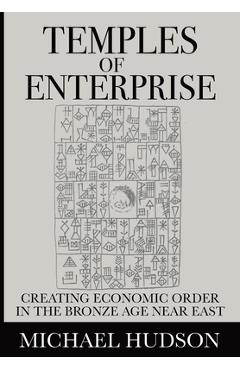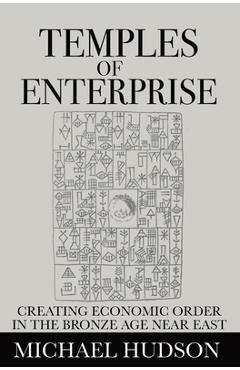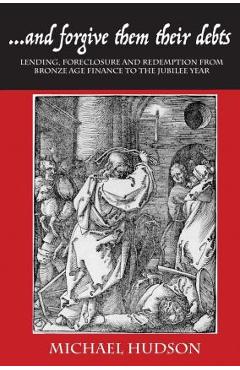Temples of Enterprise: Creating Economic Order in the Bronze Age Near East - Michael Hudson

Detalii Temples of Enterprise: Creating Economic
libris.ro
215.76 Lei
239.73 Lei
Business & Economics
Michael Hudson
Temples of Enterprise: Creating Economic - Disponibil la libris.ro
Pe YEO găsești Temples of Enterprise: Creating Economic de la Michael Hudson, în categoria Business & Economics.
Indiferent de nevoile tale, Temples of Enterprise: Creating Economic Order in the Bronze Age Near East - Michael Hudson din categoria Business & Economics îți poate aduce un echilibru perfect între calitate și preț, cu avantaje practice și moderne.
Preț: 215.76 Lei
Caracteristicile produsului Temples of Enterprise: Creating Economic
- Brand: Michael Hudson
- Categoria: Business & Economics
- Magazin: libris.ro
- Ultima actualizare: 28-10-2025 01:22:05
Comandă Temples of Enterprise: Creating Economic Online, Simplu și Rapid
Prin intermediul platformei YEO, poți comanda Temples of Enterprise: Creating Economic de la libris.ro rapid și în siguranță. Bucură-te de o experiență de cumpărături online optimizată și descoperă cele mai bune oferte actualizate constant.
Descriere magazin:
The twelve articles collected in this volume describe how the most basic features of Western economic organization - money, markets, land tenure and enterprise - were created in the temples and palaces of the ancient Near East. The perspective on these topics originated in the five international colloquia organized by the Institute for the Study of Long-term Economic Trends (ISLET) with Harvard University\'s Peabody Museum from 1994 to 2015. When these meetings began, most Assyriology, Egyptology and classical studies tended to accept the views of modern economic orthodoxy. Archaic social values were so different from today\'s views that there was resistance to recognizing the extent to which the Bronze Age economic takeoff, 3500-1200 BC, followed policies radically unlike our own. The twelve articles collected in this volume describe how the most basic features of Western economic organization - money, markets, land tenure and enterprise - were created in the temples and palaces of the ancient Near East. The perspective on these topics originated in the five international colloquia organized by the Institute for the Study of Long-term Economic Trends (ISLET) with Harvard University\'s Peabody Museum from 1994 to 2015. When these meetings began, most Assyriology, Egyptology and classical studies tended to accept the views of modern economic orthodoxy. Archaic social values were so different from today\'s views that there was resistance to recognizing the extent to which the Bronze Age economic takeoff, 3500-1200 BC, followed policies radically unlike our own. Endorsements Michael Hudson is the foremost expert on the financial and monetary systems of the antiquarian Western/Near Eastern World, from Mesopotamia to the Fall of the Roman Empire. In this work he totally demolishes the myth that money developed from a need to simplify barter transactions. Instead, money developed as a complement to credit/debt relationships, initially mainly between Temples and Kings as creditors and merchants and small farmers as debtors. A second main theme is that many small farmers borrowed out of desperation, e.g. after bad harvests, so that the only way to prevent growing inequality was to introduce occasional debtor holidays via Jubilees or clean slates. But rich creditors, outside the ruling family, did not like to do this, and, whenever they controlled policy, land holding became centralized, and tax revenue declined, leading to collapse. Hudson\'s analysis poses t

Produse asemănătoare
Produse marca Michael Hudson

...and forgive them their debts: Lending, Foreclosure and Redemption From Bronze Age Finance to the Jubilee Year - Michael Hudson
![]() libris.ro
libris.ro
Actualizat in 28/10/2025
245.15 Lei

Temples of Enterprise: Creating Economic Order in the Bronze Age Near East - Michael Hudson
![]() libris.ro
libris.ro
Actualizat in 28/10/2025
215.76 Lei

Temples of Enterprise: Creating Economic Order in the Bronze Age Near East - Michael Hudson
![]() libris.ro
libris.ro
Actualizat in 28/10/2025
290.16 Lei

J Is for Junk Economics: A Guide to Reality in an Age of Deception - Michael Hudson
![]() libris.ro
libris.ro
Actualizat in 28/10/2025
319.92 Lei

The Destiny of Civilization: Finance Capitalism, Industrial Capitalism or Socialism - Michael Hudson
![]() libris.ro
libris.ro
Actualizat in 28/10/2025
189.72 Lei

...and Forgive Them Their Debts: Lending, Foreclosure and Redemption from Bronze Age Finance to the Jubilee Year - Michael Hudson
![]() libris.ro
libris.ro
Actualizat in 28/10/2025
222.83 Lei